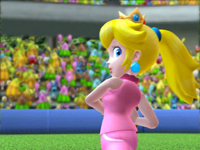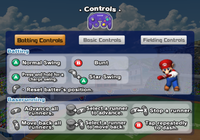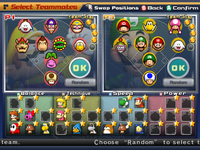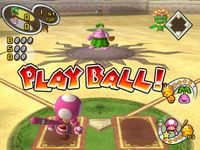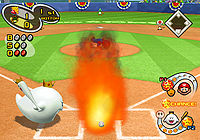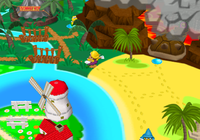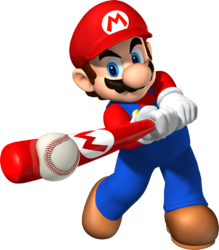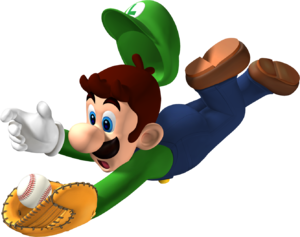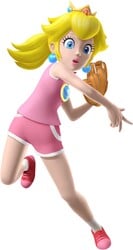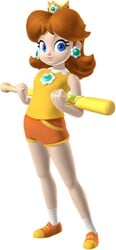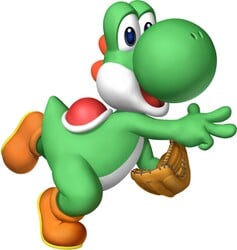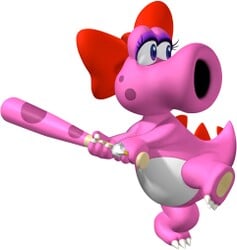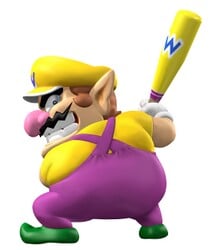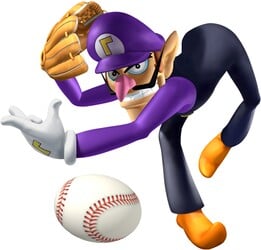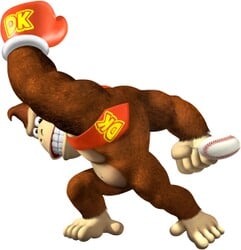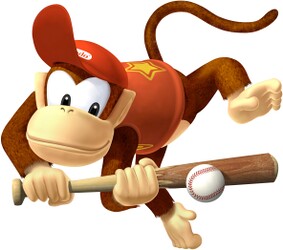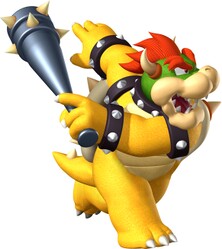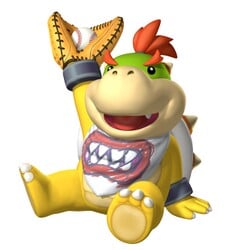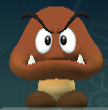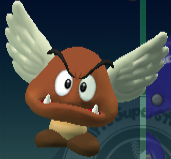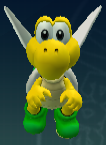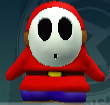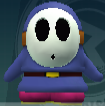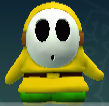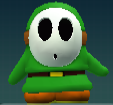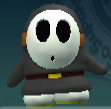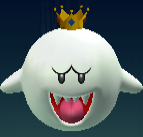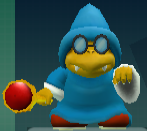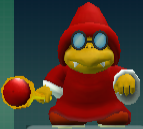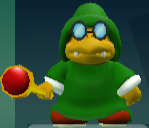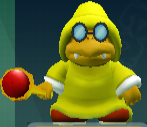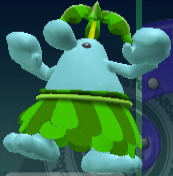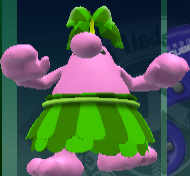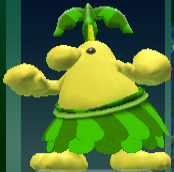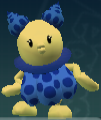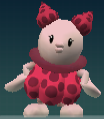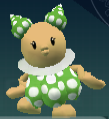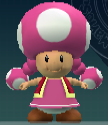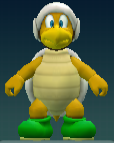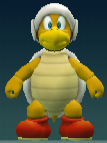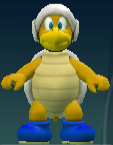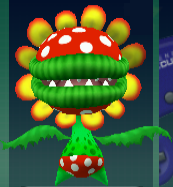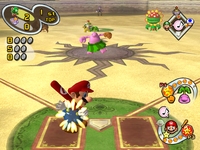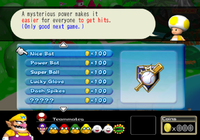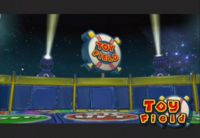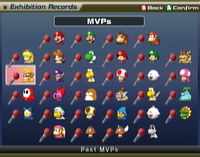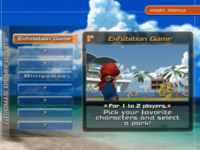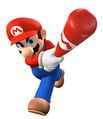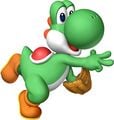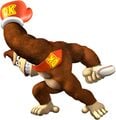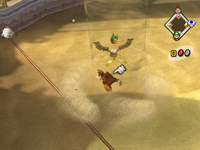Mario Superstar Baseball: Difference between revisions
No edit summary |
No edit summary |
||
| Line 1: | Line 1: | ||
{{italic title}} | {{italic title}} | ||
{{FA}} | {{FA}} | ||
{{unreferenced|Release dates}} | |||
{{redirect|MSB|the Nintendo DS game titled ''Mario Slam Basketball'' in British English|''[[Mario Hoops 3-on-3|Mario Hoops 3-on-3]]''}} | {{redirect|MSB|the Nintendo DS game titled ''Mario Slam Basketball'' in British English|''[[Mario Hoops 3-on-3|Mario Hoops 3-on-3]]''}} | ||
{{game infobox | {{game infobox | ||
| Line 6: | Line 7: | ||
|developer=[[Bandai Namco Entertainment|Namco]]<br>[[Nintendo SPD Group No.4]] | |developer=[[Bandai Namco Entertainment|Namco]]<br>[[Nintendo SPD Group No.4]] | ||
|publisher=[[Nintendo]] | |publisher=[[Nintendo]] | ||
|release={{release|Japan|July 21, 2005|USA|August 29, 2005|Australia|November 3, 2005 | |release={{release|Japan|July 21, 2005|USA|August 29, 2005|Australia|November 3, 2005|Europe|November 11, 2005}} | ||
|languages={{languages|en_us=y|jp=y}} | |languages={{languages|en_us=y|jp=y}} | ||
|modes=1–4 players | |modes=1–4 players | ||
| Line 91: | Line 92: | ||
Star Skills can be replenished by hitting ball park features. They can also be replenished by striking a player out or making a batter reach a base safely when the words, "Star Chance!" appear. Team captains and sub-characters use up one Team Star while captains as members use up two Team Stars. | Star Skills can be replenished by hitting ball park features. They can also be replenished by striking a player out or making a batter reach a base safely when the words, "Star Chance!" appear. Team captains and sub-characters use up one Team Star while captains as members use up two Team Stars. | ||
If a batter has all 5 Team Stars and hits a charged shot with perfect contact while still holding the {{button|gcn|R}} button, they will get a near-guaranteed home run.<ref> | If a batter has all 5 Team Stars and hits a charged shot with perfect contact while still holding the {{button|gcn|R}} button, they will get a near-guaranteed home run.<ref>{{cite|url=www.youtube.com/watch?v=lTboOvGtGF4|author=sylvisorex|date=May 30, 2022|title=dry bones 5 star home run|publisher=YouTube|accessdate=June 29, 2024}}</ref> | ||
===Challenge mode=== | ===Challenge mode=== | ||
| Line 152: | Line 153: | ||
==Characters== | ==Characters== | ||
Character stats displayed here are taken from the listings in the game.<ref> | Character stats displayed here are taken from the listings in the game.<ref>{{cite|url=drive.google.com/file/d/1hg-5BNd8lPuGqVulGneBlo9pj2lmiJP5/view?usp=sharing|title=Spreadsheet of data-mined character stats|publisher=Google Docs|language=en}}</ref><ref>{{cite|url=docs.google.com/spreadsheets/d/16cEcCq-Gkudx5ESfqzS0MJlQI7WTvSIWsHVZS8jv750/edit?usp=sharing|title=Spreadsheet of data-mined character stats (reader-friendly)|publisher=Google Docs|language=en}}</ref> | ||
===Team captains=== | ===Team captains=== | ||
| Line 2,507: | Line 2,508: | ||
Bad chemistry occurs conversely. When a character throws a ball to a character they dislike, the ball travels more slowly and is sometimes out of line. Bad chemistry is symbolized when a small zigzag line appears next to the players. Examples of bad chemistry include [[Mario]] and [[Bowser]], [[Luigi]] and [[King Boo]]. However, bad chemistry only occurs when the characters are fielding, and it does not happen all the time. | Bad chemistry occurs conversely. When a character throws a ball to a character they dislike, the ball travels more slowly and is sometimes out of line. Bad chemistry is symbolized when a small zigzag line appears next to the players. Examples of bad chemistry include [[Mario]] and [[Bowser]], [[Luigi]] and [[King Boo]]. However, bad chemistry only occurs when the characters are fielding, and it does not happen all the time. | ||
There exists chemistry tables in-game which determine the above features and more. Each character has a chemistry value, from 0-100, with every other character in the game. 90 and above indicates chemistry, whereas 15 and below indicate bad chemistry. These values are also used in calculating Team Stars pre-game. The game will average each player's chemistry with the captain and convert the average to team stars.<ref> | There exists chemistry tables in-game which determine the above features and more. Each character has a chemistry value, from 0-100, with every other character in the game. 90 and above indicates chemistry, whereas 15 and below indicate bad chemistry. These values are also used in calculating Team Stars pre-game. The game will average each player's chemistry with the captain and convert the average to team stars.<ref>{{cite|url=docs.google.com/spreadsheets/d/e/2PACX-1vRVUxlpm8jj8FLNfboz9j5kwCtw5I6NcTiWvOyHVa85gNaszOTFL-TPxAMlwr29eEUqXkn6e5NLygEF/pubhtml?gid=1560396594&single=true|title=Color-coded spreadsheet of the in-game chemistry tables|publisher=Google Docs|language=en}}</ref> The key is as follows (x̄ = average captain chemistry): | ||
* 5 star team: x̄ ≥ 70 | * 5 star team: x̄ ≥ 70 | ||
| Line 2,909: | Line 2,910: | ||
==External links== | ==External links== | ||
{{NIWA| | {{NIWA|NWiki=1StrategyWiki=1}} | ||
*[https://www.nintendo.co.jp/ngc/gyqj/index.html Japanese website] | *[https://www.nintendo.co.jp/ngc/gyqj/index.html Japanese website] | ||
*[https://web.archive.org/web/20060820175654/http://mariobaseball.com/launch/index.html | *[https://web.archive.org/web/20060820175654/http://mariobaseball.com/launch/index.html American English website] | ||
*[https://www.nintendo. | *[https://www.nintendo.com/en-gb/Games/Nintendo-GameCube/Mario-Superstar-Baseball-268357.html British English website] | ||
*[https://web.archive.org/web/20200130041835/https://www.nintendo.com/consumer/gameslist/manuals/GCN_Mario_Superstar_Baseball.pdf American English manual] | *[https://web.archive.org/web/20200130041835/https://www.nintendo.com/consumer/gameslist/manuals/GCN_Mario_Superstar_Baseball.pdf American English manual] | ||
Revision as of 09:18, June 29, 2024
This article does not cite any sources. Unsourced material may be challenged and removed. Specifics: Release dates
Please help improve this article by adding citations from reliable sources.
- "MSB" redirects here. For the Nintendo DS game titled Mario Slam Basketball in British English, see Mario Hoops 3-on-3.
| Mario Superstar Baseball | |||||||||
|---|---|---|---|---|---|---|---|---|---|
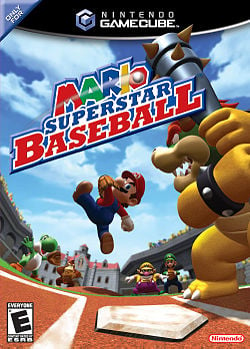 For alternate box art, see the game's gallery. | |||||||||
| Developer | Namco Nintendo SPD Group No.4 | ||||||||
| Publisher | Nintendo | ||||||||
| Platform(s) | Nintendo GameCube | ||||||||
| Release date | Template:Release[?] | ||||||||
| Language(s) | English (United States) Japanese | ||||||||
| Genre | Sports | ||||||||
| Rating(s) |
| ||||||||
| Mode(s) | 1–4 players | ||||||||
| Format | Nintendo GameCube:
| ||||||||
| Input | Nintendo GameCube:
| ||||||||
| Serial code(s) | DOL-GYQJ-JPN (Japan) | ||||||||
Mario Superstar Baseball is a sports title for the Nintendo GameCube and is the first installment of the Mario Baseball series, being the first dedicated baseball game with characters of the Super Mario franchise. Like most sports games of the Super Mario franchise, Mario Superstar Baseball is based on the traditional rules of the sport, in this case, but is differentiated with various Super Mario-themed gimmicks and other mechanics. These include characters using Star Skill abilities to cause the ball to behave differently; team captains have unique Star Skill abilities that cause a wide variety of special effects, such as attacking outfielders if batting or causing the pitched ball to behave erratically. Characters also have field abilities to differentiate themselves from other teammates. Chemistry is a feature unique to the Mario Baseball games whereby characters perform differently depending on whether they like, dislike, or are neutral to another character they are cooperating with. Additionally, most fields in the game include hazards that can affect outfielders, such as the Piranha Plants serving as obstacles in Yoshi Park.
In addition to the main Exhibition mode, in which baseball can be played freely with up to two players, the game features a single-player oriented Challenge mode that has the player controlling a designated team captain and their preset team, recruiting other captains and team players to face off against Bowser. The game also features the Toy Field mode, in which individual characters play on an interactive baseball field and get coins based on where the ball lands. Finally, the game includes several Super Mario-themed minigames with baseball mechanics, such as hitting Bob-ombs to create fireworks or collecting gems in a baseball diamond while avoiding a Chain Chomp. Toy Field and Minigames are the only modes that can support up to four players.
A sequel titled Mario Super Sluggers was released for the Wii in the summer of 2008.
Cinematics
Intro
The game's opening cinematic begins with Mario and Luigi taking warm-ups and practice at Mario Stadium. The two then see a wanted flyer featuring Bowser on it float from the sky. Elsewhere, Princess Peach, Yoshi, Donkey Kong, and Wario all receive the same posters, and decide to get to playing baseball.
In the match between Peach and Yoshi's teams, Peach gets a good swing on a pitch, and as Yoshi runs to make the catch, it bounces off a Note Block and becomes a home run, much to Yoshi's disappointment. Next, in the game between Wario and Donkey Kong's teams, Donkey Kong uses his climbing abilities to catch the ball, but is bitten by a Chain Chomp and forced to drop it. Shortly after, Diddy Kong successfully bunts, and Wario desperately tries to blow the ball into foul range, but to no avail—Lakitu calls a fair ball, leaving Wario to slam his fist into the ground in frustration.
Finally, in the big game between Mario and Wario's teams, Mario is running for home base, but Donkey Kong is on the verge of catching the ball as Peach, Daisy and Toad black out, fearing that Mario is going to be tagged out. Mario then bounds over Donkey Kong and reaches home base safely as Donkey Kong is hit in the face with the ball. Later on, after the teams have changed sides, Wario hits Mario's pitch into the stands for a home run; as he and Waluigi celebrate to the visible dismay of Mario's, Donkey Kong becomes excited and accidentally pounds Wario into the ground, causing Waluigi to laugh.
Still later in the game, Daisy is seen throwing the ball to Peach, who then throws to Yoshi as Waluigi slides towards the base—only to discover Yoshi already has the ball, causing him to fall short as Lakitu calls him out. During Donkey Kong's at-bat, he hits the ball, and Luigi runs after it as it makes a beeline for the bleachers; he manages to jump off the top of the wall and catch it for a second out. Wario is the next batter up, and points his bat at Mario. Mario winds up and throws a fastball that catches fire and passes Wario before he can swing, striking him out; its speed overloads a radar gun in the process. With all three outs, the teams change sides.
With two outs at the bottom of the ninth and the score tied 3-3 with Luigi on first base, Mario is up to bat; as he faces down Wario, he points his bat at the stands in an homage to Babe Ruth's called shot. Wario then lets loose a pitch that Mario manages to hit as everyone watches in awe—the ball sails directly into the stands where Mario pointed, scoring the game's winning home run for him and his team. Peach, Luigi and the others celebrate their victory with Mario as he reaches home base; as they do, Bowser is shown in the audience, chuckling to himself.
Challenge Mode ending
The game's ending plays when Bowser's team is defeated in Challenge Mode on Special difficulty. It begins with Mario walking through a cornfield at night and entering a baseball field as the lights turn on. Luigi, Peach, Red Toad, and Diddy Kong witness Mario's arrival. Then, Bowser confidently arrives for a rematch, with characters such as Wario and Waluigi as his teammates. After everyone gets to their positions, all prepared for the re-match, Mario makes the pitch. As the ball is thrown, the camera zooms in the ball, revealing the hidden words on it, "WE LOVE BASEBALL!", then the credits roll.
Gameplay
Mario Superstar Baseball plays similarly to actual baseball; teams take turn batting to run on the bases and fielding. The team who bats hits the ball to the field while the fielders attempt to make the batters out. Once a runner touches the home base, their team earns a point. There are three outs on an inning for the batting team. Once a team gets three outs, they switch sides. Whichever team obtains the most points wins. Teams, led by specific team captains, can have up to nine members.
Controls
Menu controls
 : Confirm
: Confirm : Cancel
: Cancel /
/ : Select menu items
: Select menu items : Switch between positions and line-ups
: Switch between positions and line-ups : Changes color of certain characters
: Changes color of certain characters : Deselect all members
: Deselect all members : Change hand type of a character
: Change hand type of a character : View profile of a character selected
: View profile of a character selected
In-game controls (batter)
 : Normal Swing (holding
: Normal Swing (holding  causes the swing to charge)
causes the swing to charge) : Bunt
: Bunt : Reset batter to default position
: Reset batter to default position /
/ : Move the batter
: Move the batter +
+  : Use Star Swing
: Use Star Swing : Make baserunners attempt to steal a base (tilt
: Make baserunners attempt to steal a base (tilt  to select which base to steal)
to select which base to steal)
In-game controls (baserunner)
 : Advance a base. Press
: Advance a base. Press  to stop the runners.
to stop the runners. : Return to base. Press
: Return to base. Press  to stop the runners.
to stop the runners. : Tapping it makes characters dash
: Tapping it makes characters dash
In-game controls (pitcher)
 /
/ : Change pitcher's position on mound/control the ball
: Change pitcher's position on mound/control the ball : Normal Pitch (holding
: Normal Pitch (holding  causes the pitch to charge)
causes the pitch to charge) +
+  : Throw a Star Pitch
: Throw a Star Pitch : Pick off runners
: Pick off runners : Reset pitcher to default position
: Reset pitcher to default position
In-game controls (fielder)
 /
/ : Move, choose base to throw to
: Move, choose base to throw to +
+  : Diving Catch
: Diving Catch : Jump (without ball), throw ball, use unique talent (if any)
: Jump (without ball), throw ball, use unique talent (if any) : Tapping it makes characters dash
: Tapping it makes characters dash
Exhibition mode
Exhibition mode is a standard one or two player game of baseball. Players fill out a roster and play a game. There are six different, unique stadiums in which players can choose to play in. The player, before playing in a stadium, can adjust options such as number of innings, mercy, which player bats first, and turning Star Skills on and off. Players can also adjust field settings, running, drop spots, and batting cursors.
Star skill
A new feature in this game is the ability to use a Star Skill. Star Skills can be activated either while pitching or while batting. Anyone in this game can use a Star Skill, but a team captain's Star Skill is superior to a sub-character's Star Skill. Team Captains have mostly different Star Skills, however, captains that usually pair with each other (Mario and Luigi, Peach and Daisy) have similar Star Skills. The amount of Star Skills that can be used is represented by 5 Team Stars in a meter. The amount of starting Team Stars depend on the sub-characters' chemistry with the team captain.
Star Skills can be replenished by hitting ball park features. They can also be replenished by striking a player out or making a batter reach a base safely when the words, "Star Chance!" appear. Team captains and sub-characters use up one Team Star while captains as members use up two Team Stars.
If a batter has all 5 Team Stars and hits a charged shot with perfect contact while still holding the ![]() button, they will get a near-guaranteed home run.[1]
button, they will get a near-guaranteed home run.[1]
Challenge mode
Challenge mode (the main game mode of Mario Superstar Baseball) is a game mode where one player selects one of five Team Captains (Mario, Peach, Donkey Kong, Wario, and Yoshi) and plays with a pre-made team. The player wanders a map of the Mushroom Kingdom and can play minigames to earn coins and spend at a Shop, where power-ups can be bought. The player's objective is to beat the other four captains in a game of baseball, on their own course. In order to get the others, the player should see the scout flags for the match. Scout flags are earned by completing scout missions, such as getting a hit, or scoring a run. If the scout mission is not completed, the player will not earn the scout flag(s). There are scout flags next to the characters' faces. These flags serve as a purpose for recruiting other characters to the player's team. Each character has a set number of Scout Flags (up to five flags), with team captains requiring more Scout Flags (3 on the Mushroom level, 4 on the Flower level and Star level, and 5 on the Special level) and sub-captains and characters of race (excluding the characters with color changes) needing the median number (2 on Mushroom and on Flower, 3 on Star, and 4 on Special) and minor characters needing the least (1 on Mushroom, 2 on Flower and Star, and 3 on Special).
The only exception is Donkey Kong's team, with all his teammates needing only one scout flag on the mushroom level, 2 on the flower and star levels, and 3 on the special level. Bowser's team cannot be recruited due to no scout flags; the only way to do so is when Bowser is selected as a challenge mode captain. When Bowser is chosen, the team players require the same number of flags as the captain when he is not chosen. Before the match, the opposing team's has the message "Round up Players" on their batting order screen. The order of the opposing team is random as well as the fielding position, with the exception of Bowser's team, whose batting order and fielding positions remain the same. Players from other teams can be recruited after clearing certain missions. When the player recruits the captain they are not able to recruit other characters on their team unless the player faces Bowser Jr.
After beating all four opponents, the path to Bowser's Castle opens, where the player is able to challenge Bowser's team. Once Bowser's team is defeated, Challenge Mode is cleared. Additionally, Bowser Jr. wanders the map. Coming in contact with him starts a short, half-inning game where the player is put in various situations. If the player has had a captain join their team, they can unlock characters on their team from Bowser Jr. Sometimes, they are ahead by a point and must defend their position. Other times, they are behind and must make a comeback. Challenge Mode is the only way to unlock characters.
There are four difficulties to Challenge Mode: Mushroom, Flower, Star, and Special. Once Special mode is cleared, Bowser becomes a playable captain. In Bowser mode, Bowser must beat the other five captains, and then play a team of nine of the ten captains and sub-captains, led by Mario (the excluded character is random). Bowser can recruit other characters, excluding the captains and sub-captains, and in Bowser mode, Bowser Jr. does not wander the map.
Names of levels in other languages
- Mushroom Level
| Language | Name | Meaning | Notes |
|---|---|---|---|
| Japanese | キノコレベル[?] Kinoko Reberu |
Kinoko Level |
- Flower Level
| Language | Name | Meaning | Notes |
|---|---|---|---|
| Japanese | フラワーレベル[?] Furawā Reberu |
Flower Level |
- Star Level
| Language | Name | Meaning | Notes |
|---|---|---|---|
| Japanese | スターレベル[?] Sutā Reberu |
Star Level |
- Special Level
| Language | Name | Meaning | Notes |
|---|---|---|---|
| Japanese | スペシャルレベル[?] Supesharu Reberu |
Special Level |
Names of scout missions in other languages
- Strike 'Em Out!
| Language | Name | Meaning | Notes |
|---|---|---|---|
| Japanese | さんしんをとれ![?] Sanshin O Tore! |
Get a Strikeout! |
- Get a Hit!
| Language | Name | Meaning | Notes |
|---|---|---|---|
| Japanese | ヒットを打て![?] Hitto O Ute! |
Strike a Hit! |
Superstar Challenge
- Main article: Superstar Challenge
In order for players to become star characters, they must complete specific Star Missions for a character in Challenge Mode. These are optional, but Superstar characters have an increase in stats. The number of Star Missions vary depending on the character; generally, team captains have more Star Missions than team players. Characters have a star title: these change when characters achieve more missions. In addition, some challenges may be completed on any difficulty while some others must be completed on the Special difficulty.
Characters
Character stats displayed here are taken from the listings in the game.[2][3]
Team captains
| Team captains | |||||||||||||||||||||||||||||||||||||||||||||||||||||||||||||||||||||||||||||||||||||||||||||||||||||||||||||||||||||||
|---|---|---|---|---|---|---|---|---|---|---|---|---|---|---|---|---|---|---|---|---|---|---|---|---|---|---|---|---|---|---|---|---|---|---|---|---|---|---|---|---|---|---|---|---|---|---|---|---|---|---|---|---|---|---|---|---|---|---|---|---|---|---|---|---|---|---|---|---|---|---|---|---|---|---|---|---|---|---|---|---|---|---|---|---|---|---|---|---|---|---|---|---|---|---|---|---|---|---|---|---|---|---|---|---|---|---|---|---|---|---|---|---|---|---|---|---|---|---|---|
|
|
|
| ||||||||||||||||||||||||||||||||||||||||||||||||||||||||||||||||||||||||||||||||||||||||||||||||||||||||||||||||||||
|
|
|
| ||||||||||||||||||||||||||||||||||||||||||||||||||||||||||||||||||||||||||||||||||||||||||||||||||||||||||||||||||||
|
|
|
| ||||||||||||||||||||||||||||||||||||||||||||||||||||||||||||||||||||||||||||||||||||||||||||||||||||||||||||||||||||
Team players
If the player presses ![]() on some of these characters, they can use alternate colors for those characters. They each have their own unique stats and are slightly different from one another. In Challenge Mode, the player can use all of one character's alternate colors on their team (e.g. if Peach is the player's captain, they can use all five Toad colors on their team). In the other modes, however, players are only allowed one alternate color per character.
on some of these characters, they can use alternate colors for those characters. They each have their own unique stats and are slightly different from one another. In Challenge Mode, the player can use all of one character's alternate colors on their team (e.g. if Peach is the player's captain, they can use all five Toad colors on their team). In the other modes, however, players are only allowed one alternate color per character.
| Default team players | ||||||||||||||||||||||||||||||||||||||||||||||||||||||||||||||||||||||||||||||||||||||||||||||||||||||||||||||||||||||||||||||||||||
|---|---|---|---|---|---|---|---|---|---|---|---|---|---|---|---|---|---|---|---|---|---|---|---|---|---|---|---|---|---|---|---|---|---|---|---|---|---|---|---|---|---|---|---|---|---|---|---|---|---|---|---|---|---|---|---|---|---|---|---|---|---|---|---|---|---|---|---|---|---|---|---|---|---|---|---|---|---|---|---|---|---|---|---|---|---|---|---|---|---|---|---|---|---|---|---|---|---|---|---|---|---|---|---|---|---|---|---|---|---|---|---|---|---|---|---|---|---|---|---|---|---|---|---|---|---|---|---|---|---|---|---|---|
|
|
| ||||||||||||||||||||||||||||||||||||||||||||||||||||||||||||||||||||||||||||||||||||||||||||||||||||||||||||||||||||||||||||||||||
|
|
|
| |||||||||||||||||||||||||||||||||||||||||||||||||||||||||||||||||||||||||||||||||||||||||||||||||||||||||||||||||||||||||||||||||
|
|
| ||||||||||||||||||||||||||||||||||||||||||||||||||||||||||||||||||||||||||||||||||||||||||||||||||||||||||||||||||||||||||||||||||
|
|
|
| |||||||||||||||||||||||||||||||||||||||||||||||||||||||||||||||||||||||||||||||||||||||||||||||||||||||||||||||||||||||||||||||||
|
|
| ||||||||||||||||||||||||||||||||||||||||||||||||||||||||||||||||||||||||||||||||||||||||||||||||||||||||||||||||||||||||||||||||||
|
|
|
| |||||||||||||||||||||||||||||||||||||||||||||||||||||||||||||||||||||||||||||||||||||||||||||||||||||||||||||||||||||||||||||||||
|
|
| ||||||||||||||||||||||||||||||||||||||||||||||||||||||||||||||||||||||||||||||||||||||||||||||||||||||||||||||||||||||||||||||||||
|
|
|
| |||||||||||||||||||||||||||||||||||||||||||||||||||||||||||||||||||||||||||||||||||||||||||||||||||||||||||||||||||||||||||||||||
|
|
| ||||||||||||||||||||||||||||||||||||||||||||||||||||||||||||||||||||||||||||||||||||||||||||||||||||||||||||||||||||||||||||||||||
|
|
| ||||||||||||||||||||||||||||||||||||||||||||||||||||||||||||||||||||||||||||||||||||||||||||||||||||||||||||||||||||||||||||||||||
| Unlockable team players | ||||||||||||||||||||||||||||||||||||||||||||||||||||||||||||||||||||||||||||||||||||||||||||||||||||||||||||||||||||||||||||||||||||
|
|
|
| |||||||||||||||||||||||||||||||||||||||||||||||||||||||||||||||||||||||||||||||||||||||||||||||||||||||||||||||||||||||||||||||||
|
|
|
| |||||||||||||||||||||||||||||||||||||||||||||||||||||||||||||||||||||||||||||||||||||||||||||||||||||||||||||||||||||||||||||||||
Teams
The following are lists of teams formed by their respective captains in Exhibition Mode.
The first is a common team, formed if most teammates are a different character type than the captain. The second team is used when the majority of teammates share the captain's character type. The third and fourth teams require the captain to include certain characters (listed below).
Asterisks indicate that the team name returns in Mario Super Sluggers.
Chemistry
- Main article: Chemistry
Player chemistry emphasizes the relationships between characters. When forming a team, the relationship status between the captain and their teammates affects the number of power stars the team starts with. Additionally, in the game, good chemistry occurs with two friends. When a player throws a ball to their "buddy", the ball travels faster than a normal throw would. Additionally, a player hits better when one of their friends are on base. Examples are Mario and Luigi, Diddy Kong and Dixie Kong. Good chemistry is symbolized by a musical note.
Bad chemistry occurs conversely. When a character throws a ball to a character they dislike, the ball travels more slowly and is sometimes out of line. Bad chemistry is symbolized when a small zigzag line appears next to the players. Examples of bad chemistry include Mario and Bowser, Luigi and King Boo. However, bad chemistry only occurs when the characters are fielding, and it does not happen all the time.
There exists chemistry tables in-game which determine the above features and more. Each character has a chemistry value, from 0-100, with every other character in the game. 90 and above indicates chemistry, whereas 15 and below indicate bad chemistry. These values are also used in calculating Team Stars pre-game. The game will average each player's chemistry with the captain and convert the average to team stars.[4] The key is as follows (x̄ = average captain chemistry):
- 5 star team: x̄ ≥ 70
- 4 star team: 70 > x̄ ≥ 55
- 3 star team: 55 > x̄ ≥ 35
- 2 star team: 35 > x̄ ≥ 15
- 1 star team: 15 > x̄ > 0
- 0 star team: x̄ = 0 (occurs with a team of 9 of the same character; only possible with cheats)
Abilities
Revealed abilities
Ball Dash
Characters: Monty Mole, Goomba
Ball Dash allows the user to gain a significant speed boost when they are holding the ball. Both walking and running speed are increased.
Body Check
Characters: Bowser, Wario, Birdo, Toad, Bowser Jr., Hammer Bro, Petey Piranha
Body Check activates by mashing the B button while running the bases and caught in a close play. If the baserunner runs to a base and the ball was thrown to that base at right before the baserunner gets to the base, there is a random chance that the baserunner runs into the fielder covering that base, causing the fielder to drop the ball, get knocked off their feet, and for the baserunner to be called safe.
Clamber
Characters: Donkey Kong, Diddy Kong, Dixie Kong, Yoshi
Clamber allows the user to climb onto walls by jumping into the wall. This is most useful on stadiums with high fences such as Peach Garden for catching balls hit high up on the wall.
Laser Beam
Characters: Donkey Kong, Bowser, Waluigi, Pianta
Laser Beam allows the user to throw the ball to home plate with a significant speed boost only when there is a baserunner on third base. This effect can be further increased with a chemistry boost.
Magical Catch
Characters: Magikoopa
Unique to Magikoopa, Magical Catch gives a large vertical and horizontal range for catching the ball, at the expense of slow execution. It is activated simply by pressing A when the ball is nearby Magikoopa. There is a small chance for Magikoopa to whiff the catch while using it.
Quick Throw
Characters: Peach, Daisy
Quick Throw allows the user to ignore throw windup and instead throw the ball very quickly, but only when the ball is thrown to the user.
Sliding Catch
Characters: Mario, Daisy, Wario, Koopa Troopa, Toadette, Shy Guy, Noki, Dry Bones
Sliding Catch gives a small horizontal range for catching the ball to the user. The user slides a fixed distance on the ground. It is activated simply by pressing A when the ball is nearby the user.
Suction
Characters: Birdo
Unique to Birdo, Suction gives a large horizontal range for catching the ball. It is activated simply by pressing A when the ball is nearby Birdo.
Super Catch
Characters: Diddy Kong, Peach, Toadsworth
Super Catch removes the ability to whiff catching the ball when fielding. It cannot, however, prevent dropping the ball due to Mario or Luigi's star swings. It is activated automatically.
Super Jump
Characters: Luigi, Waluigi, Boo, King Boo, Paratroopa, Paragoomba
Super Jump gives the user a significant jump boost in the field. It is activated by simply pressing A while walking (dashing causes a dive instead of a jump).
Tongue Catch
Characters: Yoshi
Unique to Yoshi, Tongue Catch gives a large horizontal range for catching the ball. It is activated simply by pressing A when the ball is nearby Yoshi.
Wall Jump
Characters: Mario, Luigi, Baby Mario, Baby Luigi, Toadette, Bowser Jr.
Wall Jump allows the user to jump off of the wall, giving a chance at catching balls that would otherwise be home runs. The height that the user jumps up to is character-dependent. It is activated by jumping towards the wall, then pressing A again when touching the wall.
Hidden abilities
There are two abilities that change attributes of characters, but are not explicitly stated to be abilities in-game. One of these abilities gives a significant amount of horizontal curve to the ball after the user hits it. This ability is owned by Boo, King Boo, and Boomerang Bro.
The second causes the user to cling to the wall and remain immobile for a short amount of time when jumping into the wall (similar to Wall Jump, but instead of jumping off the wall the character gets stuck to the wall and slowly slides down it). This ability is owned by Bowser, Wario, Birdo, Monty, Pianta, Hammer Bro, Toadsworth, Petey Piranha, King Boo, and Dry Bones.
Items
These items can only be bought at the shop in Challenge Mode. Coins are obtained for purchasing items by either defeating Bowser Jr. roaming across the map or winning minigames at the stadiums.
One-game items
The following items last for one game of baseball.
- Nice Bat - Lets the player's character get hits more easily.
- Power Bat - Increases the power of the character's swings.
- Super Ball - Increases the speed of the character's pitches.
- Lucky Glove - Increases the Fielding ability of the characters.
- Dash Spikes - Makes the characters move faster.
- Buddy Emblem - Increases friendship between the team. Normally incompatible characters will become more friendly to their rivals.
- Superstar - Increases all stats and boosts friendship. Not available until every other item has been purchased at least once over the course of multiple Challenge Mode playthroughs.
Permanent items
Once these items are purchased, they never need to be bought again. All of them cost 200 coins and they all do the same thing: give a character the ability to use their special hits and pitches. The difference is that each one powers up just one captain. They become active when the compatible character is on the team.
- Red Fireball – Mario
- Green Fireball – Luigi
- Lovely Heart – Princess Peach
- Pretty Flowers – Princess Daisy
- Gnarly Garlic – Wario
- Whiskered Eggplant – Waluigi
- Egg – Yoshi
- Pink Egg – Birdo
- King Banana – Donkey Kong
- Chimp Banana – Diddy Kong
- Bullet Bill – Bowser
- Jr. Mask – Bowser Jr.
One permanent item that does not give a character Special Moves is the Secret Map, which allows access to the Toy Field from Challenge Mode's overworld, therefore letting coins earned in Toy Field carry over to Challenge Mode. The Secret Map only appears if the player has beaten every minigame on the Challenge Mode overworld.
Stadiums
| Image | Corresponding Minigame | Description |
|---|---|---|
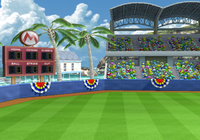 Mario Stadium |
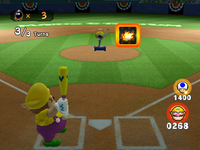 Bob-omb Derby |
A stadium belonging to Mario in a sun-drenched beachside area. There are no features in this stadium, so this stadium is well suited for pure baseball. |
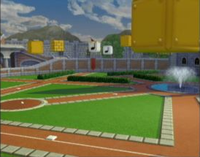 Peach Garden |
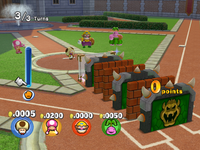 Wall Ball |
A courtyard ball park just outside Peach's Castle. Blocks float high above the fielders in this ball park. When a fly ball hits one of these blocks the ball will bounce and fly to a random direction. Brick Blocks can be destroyed while Note Blocks cannot be destroyed. Blocks also give out Star Skills when hit. |
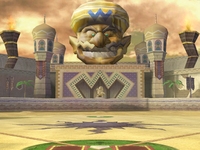 Wario Palace |
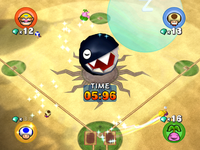 Chain Chomp Sprint |
A ball park owned by Wario in a middle of a desert. Chain Chomps guard the extreme right and left fields where the ball is fouled when landed upon there. Chain Chomps will attempt to bite the ball and they can hit characters if there is any contact. Sandstorm generators also float and make the balls change direction where it will land by generating whirlwinds. Star shaped dunes can be found in the sand and they will give a Star Skill when a ball rolls into it. |
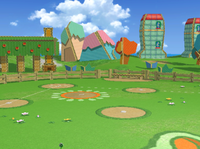 Yoshi Park |
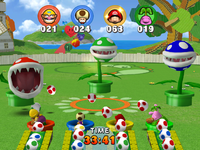 Piranha Panic |
A scenic ball park owned by Yoshi. Piranha Plants grow widespread across the field and attack anyone who goes near a stray ball. Yellow Piranha Plants do not harm players and they give out a Star Skill when hit. |
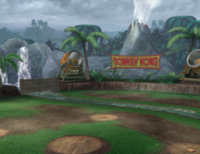 Donkey Kong Jungle |
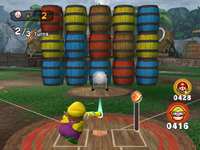 Barrel Batter |
A stadium set in a jungle, owned by Donkey Kong. Barrels get launched from a cannon and hit any player they touch. Klaptraps are also found in a stream and they will bite a player who comes too close. When hit with a ball, Klaptraps give out a Star Skill. |
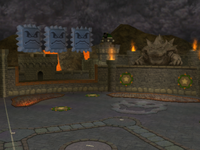 Bowser Castle |
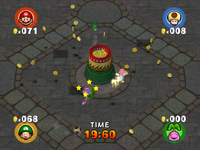 Star Dash |
A ballpark inside Bowser's castle. Flying fireballs are found in chain link lava picts and they harm anyone who touches it. Thwomps also crash down to stop any would-be home run balls. Star panels give out Star Skills when they get touched in this stadium.
The player must complete challenge mode once to unlock Bowser Castle. |
Toy Field
- Main article: Toy Field
Toy Field is a mode up to four players can participate in a special field. Players take turns hitting pitched balls into a field made up of many spaces. Players earn coins depending on where the ball has landed. The player with the most coins wins. Items can be used to either help or deter a player's progress depending if the ball landed on a ? area. Players can also get coins by striking a player out or catching a fly ball.
Minigames
Minigames are extra games outside of playing regular baseball. They usually feature baseball rules, but with a tweak added to it. Unlike exhibition, up to fours players can participate and players choose single characters instead of constructing a team. All minigames correspond to a stadium, such as Bob-omb Derby to Mario Stadium. Four difficulties are involved, though only one is available in the start for all minigames from easiest to hardest: Mushroom, Flower, Star, and Special. Flower and Star difficulties are simply harder than Mushroom, but Special usually has a tweak to it: players who play Special difficulty sets records if they beat the standard high score of the minigame.
When players beat Star difficulty for all minigames, they unlock Grand Prix Mode. Grand Prix mode is basically a collection of all minigames in this order, in Special difficulty: Bob-omb Derby, Wall Ball, Chain Chomp Sprint, Piranha Panic, Barrel Batter, and Star Dash. When completed, the player will earn a Grand Prix medal, which is stored in the Records mode.
Practice
This mode allows players to master and practice the basics of Mario Superstar Baseball, including batting, pitching, fielding, and base running. The player can also go here to practice against a CPU with any character they choose. Options in the Practice mode include: Batting, Pitching, Baserunning, and Fielding, where the player is given instructions on the category, playing as Mario. The last option, Free Play, is where the player can practice the four ways of playing baseball with any character they wish and as long as they want.
Records
This is where all outcomes of Exhibition, Challenge, Toy Field, and Minigame Mode are stored. The player can navigate through a number of menus to see all the information stored. The following are stored: past MVPs, challenge mode trophies, Grand Prix medals, star statuses, high scores for all minigames in Special difficulty, and high scores for Toy Field
Options
The options allow the player to modify game settings. Settings include turning on and off music, setting the sound scheme (Mono, Stereo, and Surround), and turning the Controller's Rumble Feature on or off.
Quotes
- Main article: List of Mario Superstar Baseball quotes
- Lakitu
- "Hey, Donkey Kong! I see your team is ready. Quite a fine group of players you have there! ...Wait... Donkey Kong! What in the... What's the deal with that boxing glove? You're using that as a bat?! Is that even allowed? Ummm... Well, OK, I guess... Here's the deal. Bowser craves a test of his might. He wishes to play a powerful team. Let me give you some details, OK?"
- "Hi there, Yoshi! Is your team ready? Hmmmm... Looks like a very quick-footed group. Bowser craves a test of his might. He wishes to play a powerful team. So, you'd better listen to some details. OK, Yoshi?"
- Princess Peach
- "That's my Mario...I had forgotten how safe I feel when I'm with you, Mario! Do you think it would be all right...if I joined your team, Mario? I can? Really?! Oh thank you! May the mushrooms bless you!"
- Wario
- "Aargh! Mario! You musta cheated last game, but not THIS time. Chump! I'm the only one in this entire kingdom with any class whatsoever! This time, I mean business! Go time! It is ON!"
- "YAAAAAAAAAARGH! You stink! But...you know what? I'm just gonna let it go. Yeah. I'm above holding grudges. I'll even lend you a hand! Admit it, you wanted me with you anyway! Wah ha ha ha ha ha ha! With me on board, victory is totally guaranteed! Heh heh heh heh... Idiot... That team will be all MINE someday... Hmm? What? Er... Nah, I didn't say anything! You're hearing things!"
- Bowser
- "Time to play me! But why bother? I'll obviously win! Gwah ha ha!"
- "Gwah ha ha ha ha! So, you finally got here, Mario! You're so late...and I HATE waiting! It's not like I blocked the road with rocks or anything! What? I'm serious! What's with the dirty look?! Anyway, let's just forget all that. So, you think you have the mightiest team now? I'll be the judge of that! Here we go!"
Staff
- Main article: List of Mario Superstar Baseball staff
The game was directed by Hideki Tomida and produced by Yasushi Ono and Toyokazu Nonaka. All three would return in their respective roles for the follow-up Mario Super Sluggers. Toyokazu Nonaka would also serve as producer on later sports titles like Mario Hoops 3-on-3 and Mario Sports Superstars. Like the other Super Mario sports titles on the Nintendo GameCube, the opening movie was directed by Kazuhiko Tsukada.
Reception
Overall, Mario Superstar Baseball was well received by critics, gaining 8.0 out of 10 from GameSpot. A GameDaily reviewer praised the game, as telling that he "found it to grow on him." IGN praised the game, but also said that "these high production values are not consistent throughout the experience."
| Reviews | |||
|---|---|---|---|
| Release | Reviewer, Publication | Score | Comment |
| Nintendo GameCube | Andrew Pfister, 1UP |
7.5/10 | Superstar Baseball was obviously meant to be played in short bursts instead of long sessions. (The lack of any sort of regular season mode ensures this.) And as this simple type of game that's neither too deep nor too shallow, Superstar's "swing at anything, steal all the time, watch out for the Thwomps in right field" brand of baseball is tough to beat. It might not be the World Series, but it's a definite wild card. |
| Nintendo GameCube | Raymond M. Padilla, Gamespy |
4/5 | As a multiplayer game, Mario Superstar Baseball is pretty excellent. Up to four players can participate in straight up baseball games, the various mini-games, and an interesting Toy Field mode (which is really just a bigger mini-game that's given its own menu option). While the regular baseball games are great whether you're going solo or playing with your buddies, the mini-games are exponentially more entertaining with friends. With a great main game and lots of fun mini-games, I'd go as far as to say that this is a much better party game than the last few Mario Party releases. |
| Nintendo GameCube | Matt Casamassina, IGN |
7.9/10 | Mario Superstar Baseball is far from the perfect baseball game, but it is nevertheless a fun, Nintendo-style take on America's favorite pastime so long as you understand what you're getting when you open the box...Although the gameplay experience is occasionally limited by a lack of features or cramped running/fielding configurations, the end result is still arcadey fun. Recommended for die-hard Nintendo fans and for gamers looking for a simplified, yet quickened take on the sport of baseball. |
| Aggregators | |||
| Compiler | Platform / Score | ||
| Metacritic | 76 | ||
| GameRankings | 76.70% | ||
Pre-release and unused content
When the game was announced at E3 2005, it was originally known as simply Mario Baseball and had a different logo. In early screenshots, the graphics for Star Chances use a different design compared to the final release.
A demo of the game is included in volumes 27-30 of the Interactive Multi-Game Demo Disc. The title screen of the demo uses the early logo, though the final logo is used in the demo selection menu. The main menu of the game's demo has eight boxes in total like the Japanese release of the game. The previews which were localized for this demo features slight formatting differences compared to the final release, including the capital letters of the header text being smaller and the "For 1 to X Players" being formatted as "For 1 to X players." The preview for Toy Field shows it was originally themed after Super Mario Bros. and shows in the sky ? Blocks, Brick Blocks, and a Warp Pipe as they are arranged in the beginning of World 1-1. In the preview for the minigames, the top-left picture was replaced. Early variations of the title screen music, victory theme, and results theme are present as well.
In the final release of the game, a baseball bat can be found within Petey Piranha's files. In-game, he uses his arms to hit the ball. Early versions of Challenge Mode's level icons are present in the game's files. They use rudimentary artwork based on their designs from Mario Kart: Double Dash!!, with the exception of the Flower level's icon which is based on the Fire Flower's design from Super Smash Bros. Melee.
Gallery
- For this subject's image gallery, see Gallery:Mario Superstar Baseball.
Media
- For a complete list of media for this subject, see List of Mario Superstar Baseball media.
| File info 0:30 |
| File info 0:30 |
| File info 0:30 |
| File info 0:30 |
References to other games
- Super Mario Bros.: The loading screen can show an 8-bit Mario hitting a ? Block or an 8-bit Mario being created and walking to the right. Also, a cover version of the overworld can be heard in Peach Garden.
- Super Mario Bros. 2: The Japanese name for the Birdo Bows team, "Catherine USA", is a reference to Super Mario USA, the Japanese release of this game.
- Super Mario World: Yoshi's House can be seen behind home plate in Yoshi Park.
- Super Mario All-Stars: The Mario All-Stars team name is a reference to this game.
- Super Mario World 2: Yoshi's Island: The Yoshi Islanders team name is a reference to this game.
- Luigi's Mansion: The Luigi Mansioneers and Luigi Vacuums team names are references to this game.
- Super Mario Sunshine: The Mario Sunshines team name and logo is a reference to this game.
- Wario World: Cyclone Generators appear in Wario Palace.
- Mario Kart: Double Dash!!: Some of the voice clips are reused from this game.
References in later games
- Itadaki Street DS: Mario Stadium is a board in this game.
- Mario Super Sluggers: This installment for the Wii is the follow-up to Mario Superstar Baseball; the gameplay mechanics are based off of this game.
- Fortune Street: The Mario Stadium board returns in this game.
Terms in other languages
- Play Ball!
| Language | Name | Meaning | Notes |
|---|---|---|---|
| Japanese | プレイボール![?] Purei Bōru! |
Play Ball! |
- Strike
| Language | Name | Meaning | Notes |
|---|---|---|---|
| Japanese | ストライク[?] Sutoraiku |
Strike |
- Foul Ball
| Language | Name | Meaning | Notes |
|---|---|---|---|
| Japanese | ファール[?] Fāru |
Foul |
- Out!
| Language | Name | Meaning | Notes |
|---|---|---|---|
| Japanese | アウト![?] Auto! |
Out! |
- Fair Ball
| Language | Name | Meaning | Notes |
|---|---|---|---|
| Japanese | フェア[?] Fea |
Fair |
- Safe
| Language | Name | Meaning | Notes |
|---|---|---|---|
| Japanese | セーフ[?] Sēfu |
Safe |
- Ball
| Language | Name | Meaning | Notes |
|---|---|---|---|
| Japanese | ボール[?] Bōru |
Ball |
- Change
| Language | Name | Meaning | Notes |
|---|---|---|---|
| Japanese | チェンジ[?] Chenji |
Change |
- Time
| Language | Name | Meaning | Notes |
|---|---|---|---|
| Japanese | タイム[?] Taimu |
Time |
- Home Run!
| Language | Name | Meaning | Notes |
|---|---|---|---|
| Japanese | ホームラン![?] Hōmuran! |
Homerun! |
- Two-Run Homer!
| Language | Name | Meaning | Notes |
|---|---|---|---|
| Japanese | 2ランホームラン!![?] 2 Ran Hōmuran!! |
2-Run Homerun!! |
- That's The Game
| Language | Name | Meaning | Notes |
|---|---|---|---|
| Japanese | ゲームセット[?] Gēmu Setto |
Game Set |
- MVP
| Language | Name | Meaning | Notes |
|---|---|---|---|
| Japanese | ヒーロー[?] Hīrō |
Hero |
- Failure
| Language | Name | Meaning | Notes |
|---|---|---|---|
| Japanese | しっぱい[?] Shippai |
Failure |
- Take Your Base
| Language | Name | Meaning | Notes |
|---|---|---|---|
| Japanese | デッドボール[?] Deddo Bōru |
Dead Ball |
- Mercy
| Language | Name | Meaning | Notes |
|---|---|---|---|
| Japanese | コールド[?] Kōrudo |
Called |
- Double Play
| Language | Name | Meaning | Notes |
|---|---|---|---|
| Japanese | ダブルプレイ[?] Daburu Purei |
Double Play |
Names in other languages
| Language | Name | Meaning | Notes |
|---|---|---|---|
| Japanese | スーパーマリオスタジアム ミラクルベースボール[?] Sūpā Mario Sutajiamu Mirakuru Bēsubōru |
Super Mario Stadium Miracle Baseball |
Trivia
- A dictionary mode (which lets the player look up baseball terms) is present in the Japanese localization only, following a similar manner to the dictionaries in the Mario Tennis series.
- On the stadium select screen, one of the preview images of Mario Stadium is actually taken from a pre-release screenshot from IGN, which is evident due to the IGN watermark being shown in the bottom right corner of the preview image.
References
- ^ sylvisorex (May 30, 2022). dry bones 5 star home run. YouTube. Retrieved June 29, 2024.
- ^ Spreadsheet of data-mined character stats. Google Docs (English).
- ^ Spreadsheet of data-mined character stats (reader-friendly). Google Docs (English).
- ^ Color-coded spreadsheet of the in-game chemistry tables. Google Docs (English).
External links
| Nintendo GameCube games | |
|---|---|
| Super Mario franchise | Luigi's Mansion (2001) • Super Mario Sunshine (2002) • Mario Party 4 (2002) • Mario Golf: Toadstool Tour (2003) • Mario Kart: Double Dash!! (2003) • Mario Party 5 (2003) • Paper Mario: The Thousand-Year Door (2004) • Mario Power Tennis (2004) • Mario Party 6 (2004) • Dance Dance Revolution: Mario Mix (2005) • Mario Superstar Baseball (2005) • Mario Party 7 (2005) • Super Mario Strikers (2005) |
| Donkey Kong franchise | Donkey Konga (2003) • Donkey Konga 2 (2004) • Donkey Kong Jungle Beat (2004) • Donkey Konga 3 JP (2005) |
| Wario franchise | Wario World (2003) • WarioWare, Inc.: Mega Party Game$! (2003) |
| Other | Super Mario 128 (2000, demo) • Super Smash Bros. Melee (2001) • Nintendo Puzzle Collection (2003) • NBA Street V3 (2005) • SSX on Tour (Nintendo Village) (2005) • Donkey Kong Racing (cancelled) • Diddy Kong Racing Adventure (cancelled) |
